'PERIGEE Aerospace' Prepares to Launch South Korea's Commercial Spaceflight Era
'PERIGEE Aerospace' Prepares to Launch South Korea's Commercial Spaceflight Era
Posted December. 20, 2024 10:55,
Updated April. 18, 2025 16:43
The Outer Space Treaty, enacted in 1967, prohibits national ownership of outer space. However, it does not address commercial activities by private companies, leaving room for their involvement. In 2015, more than 50 years later, the United States passed the "Commercial Space Launch Competitiveness Act (CSLCA)," which recognized private property rights for asteroid and space resource utilization, possession, transportation, and disposal. This legislation paved the way for private companies to enter space.
Following this, companies such as SpaceX, Blue Origin, Virgin Galactic, and Rocket Lab began to compete in the commercial spaceflight sector, enabling private spacecraft missions and commercial satellite launches. South Korea joined the global space race in May 2024 by establishing the Korea Aerospace Administration. But even before this, PERIGEE Aerospace had already launched South Korea's first efforts in the area of commercial spaceflight.
The Start of South Korea's Commercial Space Sector with PERIGEE Aerospace
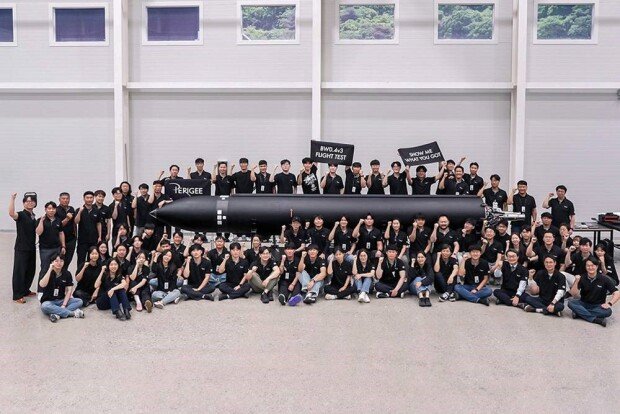
Founded in 2018 by CEO Dong-yoon Shin, PERIGEE Aerospace has been pioneering South Korea's private aerospace industry. Milestones include building the nation's first private liquid rocket engine test site in 2019, successfully conducting the first methane engine combustion test in 2020, and achieving South Korea's first private liquid-fueled rocket test launch in 2021. We spoke with Su-yeon Sim, Vice President of PERIGEE, who oversees business strategy, development, and international marketing.
Sim, who had previously worked as a diplomat for 13 years, was driven to join PERIGEE by her interest in aerospace. "I’ve always been fascinated by the aerospace sector, and enjoyed working on security-related tasks when I was at the Ministry of Foreign Affairs. Meeting CEO Shin by chance made me realize that PERIGEE aligned perfectly with my aspirations, which led me to join the company in September last year," Sim explained.

The space industry is vast, and PERIGEE focuses on the upstream sector. "The space industry can be divided into upstream and downstream. Upstream involves manufacturing and launching rockets, while downstream creates value from launched satellites and devices. PERIGEE is an upstream mobility company that builds small launch vehicles to deliver payloads into low Earth orbit, and transfer satellites that are already in orbit," Sim explained.
'Blue Whale 1': A Rocket for Small Satellites
PERIGEE’s flagship product is the Blue Whale 1, a two-stage liquid methane-fueled rocket measuring 21 meters in length, with a lift-off mass of 19.8 tons. It can carry small satellites weighing approximately 200 kg into a 500 km Sun-synchronous orbit (SSO). Its first-stage engine, Blue 1S, is protected as a national strategic technology. Sim emphasized that PERIGEE's status as a private company is a competitive advantage.
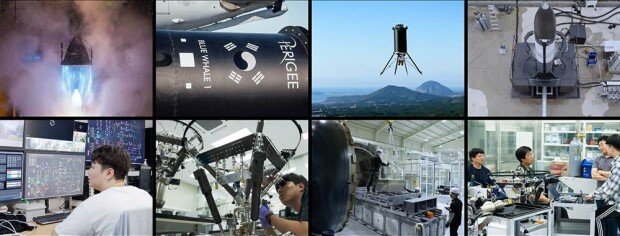
"SpaceX's Falcon 9 is the most frequently launched rocket in the commercial space sector. It carries heavy payloads and secondary payloads for smaller satellites. Small launch vehicles often target this market niche, as Rocket Lab's Electron does. Blue Whale 1 uses liquid methane like Falcon 9, but it incorporates carbon composite materials into its structure, making it lighter, cheaper, and faster," Sim explained.
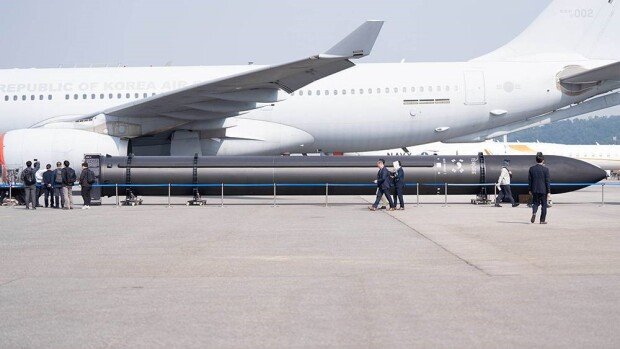
PERIGEE has been making steady progress toward the successful launch of Blue Whale 1. Achievements include the completion of the Rocket Development Complex in Okcheon, Chungbuk, in 2023 and the maritime launch site in Jeju, set to be completed by 2024. Although setbacks such as a barge accident in November caused delays, the company is still aiming for a suborbital test launch by 2025.
Expanding Hardware and Launch Services
Sim explained that profitability and market access are crucial for private aerospace companies. "Unlike publicly funded space programs, private companies must be profitable, which drives efficiency and innovation. PERIGEE has secured hardware-related contracts for engine tanks, avionics, and satellite thrusters with institutions and companies such as the Korea Astronomy and Space Science Institute and Satrec Initiative. In addition, we are collaborating with companies like SpacelineTech, Kairos Aerospace, and Dallo Aerospace to allocate payload capacities and secure customers jointly," she noted.
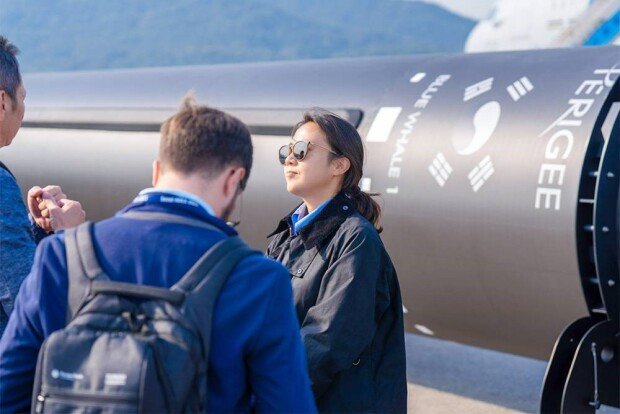
Government support has played a significant role in PERIGEE's success. Sim shared, "Since 2018, when the aerospace sector was under the Ministry of Science and ICT, we’ve received collaboration and R&D funding from ministries such as the Ministry of SMEs and Startups and the Ministry of Trade, Industry, and Energy. Local governments like Jeju and Okcheon have also provided logistical support. The Korea Aerospace Administration, established in May, has been a significant boost for our larger space projects."
Sim added, "The Administration’s establishment has brought essential funding and opportunities for collaborative projects, such as lunar exploration and reusable launch vehicles. Although the legal and institutional frameworks for private aerospace are underdeveloped, we are working in collaboration with the Administration to build a foundation for South Korea's private aerospace sector."
"SBA Seoul Unicorn Challenge Excellence Award: A Platform for Growth"
PERIGEE aims to conduct a suborbital test launch by 2025 and achieve full-scale commercial launch success by 2026. Its innovative efforts earned it the Excellence Award at the "2024 Seoul Unicorn Challenge," hosted by the Seoul Business Agency (SBA). The award comes with funding for global commercialization and additional support.
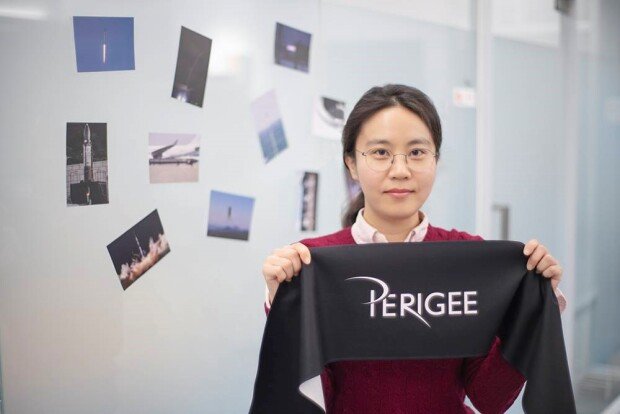
Sim commented, "Being a deep-tech manufacturing startup in aerospace sets us apart, especially as we operate in Seoul, which lacks the infrastructure typically required for such ventures. SBA’s support has enabled us to succeed in international marketing, and media like Arirang TV have helped showcase our work. In 2022, during SBA’s Hi-Seoul Venture Investment Roadshow, we presented our company and secured investor connections, which was a significant milestone for us."
Sim concluded, "Leaving a stable career in government to join a startup was a big decision, but the romance and excitement of PERIGEE Aerospace remain unchanged. We take pride in pioneering an industry that is still without established laws and institutions, and in the fact that our rockets will play a role in South Korea’s journey to space. Our competitors in the small launch vehicle sector are Rocket Lab and Electron. We aim to achieve milestones that will establish us as a globally recognized aerospace company."
by Si-hyeon Nam (sh@itdonga.com)
Following this, companies such as SpaceX, Blue Origin, Virgin Galactic, and Rocket Lab began to compete in the commercial spaceflight sector, enabling private spacecraft missions and commercial satellite launches. South Korea joined the global space race in May 2024 by establishing the Korea Aerospace Administration. But even before this, PERIGEE Aerospace had already launched South Korea's first efforts in the area of commercial spaceflight.
The Start of South Korea's Commercial Space Sector with PERIGEE Aerospace

PERIGEE Aerospace employees and the suborbital test launch vehicle Blue Whale 0.4 (BW0.4)
Founded in 2018 by CEO Dong-yoon Shin, PERIGEE Aerospace has been pioneering South Korea's private aerospace industry. Milestones include building the nation's first private liquid rocket engine test site in 2019, successfully conducting the first methane engine combustion test in 2020, and achieving South Korea's first private liquid-fueled rocket test launch in 2021. We spoke with Su-yeon Sim, Vice President of PERIGEE, who oversees business strategy, development, and international marketing.
Sim, who had previously worked as a diplomat for 13 years, was driven to join PERIGEE by her interest in aerospace. "I’ve always been fascinated by the aerospace sector, and enjoyed working on security-related tasks when I was at the Ministry of Foreign Affairs. Meeting CEO Shin by chance made me realize that PERIGEE aligned perfectly with my aspirations, which led me to join the company in September last year," Sim explained.

Su-yeon Sim served as a diplomat for 13 years and joined PERIGEE Aerospace last year, where she is in charge of international marketing and strategic planning.
The space industry is vast, and PERIGEE focuses on the upstream sector. "The space industry can be divided into upstream and downstream. Upstream involves manufacturing and launching rockets, while downstream creates value from launched satellites and devices. PERIGEE is an upstream mobility company that builds small launch vehicles to deliver payloads into low Earth orbit, and transfer satellites that are already in orbit," Sim explained.
'Blue Whale 1': A Rocket for Small Satellites
PERIGEE’s flagship product is the Blue Whale 1, a two-stage liquid methane-fueled rocket measuring 21 meters in length, with a lift-off mass of 19.8 tons. It can carry small satellites weighing approximately 200 kg into a 500 km Sun-synchronous orbit (SSO). Its first-stage engine, Blue 1S, is protected as a national strategic technology. Sim emphasized that PERIGEE's status as a private company is a competitive advantage.

The business and manufacturing processes currently being carried out by PERIGEE Aerospace
"SpaceX's Falcon 9 is the most frequently launched rocket in the commercial space sector. It carries heavy payloads and secondary payloads for smaller satellites. Small launch vehicles often target this market niche, as Rocket Lab's Electron does. Blue Whale 1 uses liquid methane like Falcon 9, but it incorporates carbon composite materials into its structure, making it lighter, cheaper, and faster," Sim explained.

The integrated first and second stage rockets of Blue Whale 1 on display
PERIGEE has been making steady progress toward the successful launch of Blue Whale 1. Achievements include the completion of the Rocket Development Complex in Okcheon, Chungbuk, in 2023 and the maritime launch site in Jeju, set to be completed by 2024. Although setbacks such as a barge accident in November caused delays, the company is still aiming for a suborbital test launch by 2025.
Expanding Hardware and Launch Services
Sim explained that profitability and market access are crucial for private aerospace companies. "Unlike publicly funded space programs, private companies must be profitable, which drives efficiency and innovation. PERIGEE has secured hardware-related contracts for engine tanks, avionics, and satellite thrusters with institutions and companies such as the Korea Astronomy and Space Science Institute and Satrec Initiative. In addition, we are collaborating with companies like SpacelineTech, Kairos Aerospace, and Dallo Aerospace to allocate payload capacities and secure customers jointly," she noted.

Vice President Su-yeon Sim shows Blue Whale 1 to foreign representatives
Government support has played a significant role in PERIGEE's success. Sim shared, "Since 2018, when the aerospace sector was under the Ministry of Science and ICT, we’ve received collaboration and R&D funding from ministries such as the Ministry of SMEs and Startups and the Ministry of Trade, Industry, and Energy. Local governments like Jeju and Okcheon have also provided logistical support. The Korea Aerospace Administration, established in May, has been a significant boost for our larger space projects."
Sim added, "The Administration’s establishment has brought essential funding and opportunities for collaborative projects, such as lunar exploration and reusable launch vehicles. Although the legal and institutional frameworks for private aerospace are underdeveloped, we are working in collaboration with the Administration to build a foundation for South Korea's private aerospace sector."
"SBA Seoul Unicorn Challenge Excellence Award: A Platform for Growth"
PERIGEE aims to conduct a suborbital test launch by 2025 and achieve full-scale commercial launch success by 2026. Its innovative efforts earned it the Excellence Award at the "2024 Seoul Unicorn Challenge," hosted by the Seoul Business Agency (SBA). The award comes with funding for global commercialization and additional support.

Vice President Su-yeon Sim expressed her determination to overcome challenges in uncharted areas and lay the foundation for South Korea's private aerospace sector.
Sim commented, "Being a deep-tech manufacturing startup in aerospace sets us apart, especially as we operate in Seoul, which lacks the infrastructure typically required for such ventures. SBA’s support has enabled us to succeed in international marketing, and media like Arirang TV have helped showcase our work. In 2022, during SBA’s Hi-Seoul Venture Investment Roadshow, we presented our company and secured investor connections, which was a significant milestone for us."
Sim concluded, "Leaving a stable career in government to join a startup was a big decision, but the romance and excitement of PERIGEE Aerospace remain unchanged. We take pride in pioneering an industry that is still without established laws and institutions, and in the fact that our rockets will play a role in South Korea’s journey to space. Our competitors in the small launch vehicle sector are Rocket Lab and Electron. We aim to achieve milestones that will establish us as a globally recognized aerospace company."
by Si-hyeon Nam (sh@itdonga.com)







